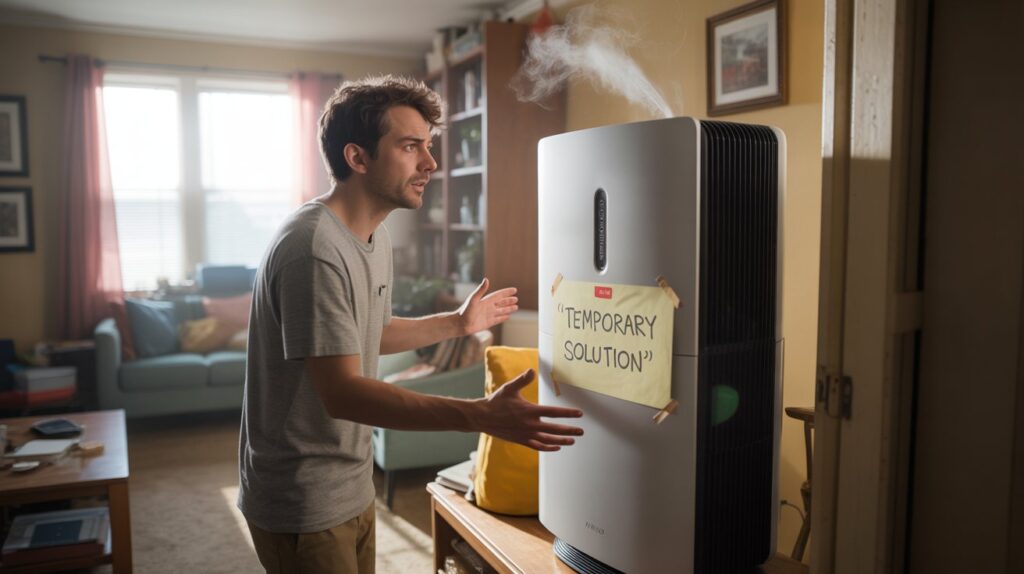Can an Air Purifier Be Too Big for a Room?
Air purifiers help maintain clean indoor air. However, it is important to consider whether an air purifier might be too powerful for your space. In this blog, I’ll explain the key points to keep in mind when selecting an air purifier. It addresses common concerns and offers practical advice to help you choose the right unit for your room size and needs.

Air Purifier Sizing
When it comes to air purifiers, bigger isn’t always better. The key is finding the right balance between room size and purifier capacity. Not sure what that means for your home? Find out what size air purifier you need here.
Many air quality experts recommend choosing an air purifier with a CADR rating about two-thirds the size of your room. This ensures efficient cleaning without excessive energy use or noise.
The Myth of "Too Big"
Technically, an air purifier can’t be too large for a room in terms of air cleaning ability. A larger unit will simply clean the air more quickly and efficiently. However, there are other factors to consider:
- Energy consumption
- Noise levels
- Physical space requirements
- Cost-effectiveness
CADR and Room Size
Clean Air Delivery Rate (CADR) is a crucial metric for determining an air purifier’s effectiveness. It measures how quickly the unit can filter air in a given space.
- For optimal performance, choose a purifier with a CADR that matches your room size
- A higher CADR than necessary isn’t harmful, but may be overkill
The Two-Thirds Rule
A general guideline recommended by ENERGY STAR is the “2/3 rule” – choose an air purifier with a CADR that is at least two-thirds of your room’s square footage. For instance, for a 150 square foot room, you’d need an air purifier with a CADR of at least 100.
The Pros and Cons of Oversized Air Purifiers
Advantages
- Faster air cleaning
- More effective in larger or open spaces
- Better performance during high pollution events (e.g., wildfires)
Disadvantages
- Higher energy costs
- Increased noise levels, especially at higher settings
- Larger physical footprint
- Potentially unnecessary expense
Real-World Considerations
Open Floor Plans
In homes with open layouts, a larger air purifier might be beneficial. It can handle the increased air volume and circulation between connected spaces.
Multiple Small Units vs. One Large Unit
For larger areas, consider using multiple smaller air purifiers instead of one oversized unit. This approach offers several benefits:
- More even air distribution
- Flexibility in placement
- Potentially lower overall cost
- Redundancy in case one unit fails
Energy Efficiency
Larger air purifiers often consume more energy, even at lower settings. If energy efficiency is a priority, a properly sized unit or multiple smaller units might be more appropriate.
Addressing Common Concerns
Will a large air purifier dry out my room?
No, air purifiers do not remove moisture from the air. This is a common misconception. They only filter particles and, in some cases, gases.
Do I need to run a large air purifier constantly?
Not necessarily. Many modern air purifiers have smart sensors that adjust operation based on air quality. This can help optimize performance and energy use.
Choosing the Right Size: A Step-by-Step Guide
- Measure your room’s square footage
- Determine the air changes per hour (ACH) you need (higher for allergies or asthma)
- Consider ceiling height (for rooms taller than 8 feet)
- Look for a CADR rating that matches your room size and ACH needs
- Factor in your specific air quality concerns (pets, smoking, etc.)
Final Words
While an air purifier can’t be too big in terms of cleaning ability, oversized units may not be the most practical or cost-effective solution for your space. Focus on finding the right balance between performance, energy efficiency, and your specific needs.
Remember, the best air purifier is one that you’ll actually use consistently. Choose a size and model that fits comfortably in your space and lifestyle for the best long-term results in improving your indoor air quality.
About Author
Tayyabah Zahoor is an expert writer with a Bachelor's degree in Physics. She specializes in creating content for affiliate websites, particularly about air purifiers. Using her scientific knowledge, she compares different air purifiers by analyzing their features and effectiveness. This helps her provide clear and helpful information to consumers looking for the best options.
